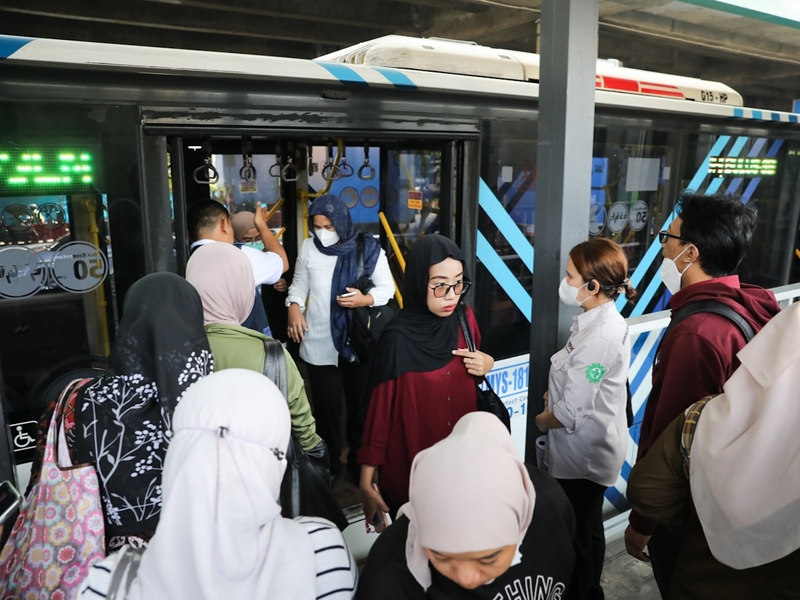

Tuesday, July 22nd 2025 Reporter: Budhi Firmansyah Surapati Translator: Maria Inggita 159

(Foto: Ilustrasi)
Jakarta Vice Governor Rano Karno outlined several measures taken by the Jakarta Provincial Government to address traffic congestion, flooding, and unemployment.
"This requires deeper strategy between the Jakarta Provincial Government, central government, and regional governments,"
He conveyed these points in response to City Council (DPRD) factions' general views on the 2025 Revised City Budget (APBD) Regional Regulation Draft (Raperda) at the Jakarta DPRD Plenary Meeting, on Monday (7/21).
Regarding managing traffic and public transportation, Rano mentioned that the city encourages citizens to shift from private vehicles to public transport through mass media and social media, implement "Public Transport Wednesday" program for all employees within the Jakarta Provincial Government, conduct outreach to schools in Jakarta and collaborate with radio stations.
Moreover, the city is advancing Transit Oriented Development (TOD), expanding public transportation, and promoting the use of park and ride facilities.
Regarding transportation subsidies, he noted that additional public transport fleets are being provided to help increase riderships and trip volume.
To reduce congestion, Rano emphasized the use of a comprehensive push-and-pull strategy, including disincentives for private vehicle use. He also highlighted the implementation of the odd-even traffic policy on 25 roads, with further reviews planned for traffic demand management.
"This requires deeper strategy between the Jakarta Provincial Government, central government, and regional governments across the Greater Jakarta (Jabodetabek), as well as active public participation," he stressed.
Rano added that the city also strengthening sea transportation by improving inter-island access to Thousand Islands, expanding boat rutes with main and feeder lines, increasing the number of vessels to support tourism and school transportation.
In addressing unemployment, Rano asserted that the city is committed to improving public welfare in the employment sector through various strategic programs, including enhancing workforce quality and productivity through skills training and productive improvement initiatives.
"We are also committed to promoting entrepreneurship and self-employment through expanded job opportunities," he said.
In addition, the city is working to improve access to job information through job fair and web-based job vacancy portal.
To optimize Job Fair and reduce unemployment, Rano explained that success is measured by the number of job seekers hired during the events, which also serves as an evaluation tool for the future job fairs.
Developing reliable and user-friendly digital platforms to efficiently connect job seekers and employers is also a priority.
On food subsidies, in response to questions and input received, Rano mentioned that the distribution of subsidized food packages is adjusted according to the needs of beneficiaries.
Starting July 2025, the online registration system for food subsidies has been integrated with PT. Bank Jakarta's whitelist system and linked with NIK (ID numbers), ensuring that only registered recipients can make purchases.
"Those who face difficulties in registering online will be assisted at nearby Perumda Pasar Jaya outlets or RPTRAs," he added.
In response to flood mitigation efforts, Rano explained that the city continues to improve river capacity through land acquisition in accordance with existing regulations, intensive coordination with central government to determine river segments for normalization, and dredging drainage channels.
In addressing tidal flood in coastal areas, he said that government is committed to completing the construction of Phase A of NCICD coastal sea wall on the remaining segments through a multiyear mechanism.
"Besides, we also build reservoirs, lakes, and retention basis in potential areas to manage floodwaters and serve as a raw water source for clean water," he stated.
Regarding decent housing provision, Rano pointed out that the city government aims to make rental apartments (Rusunawa) a transitional or first-step housing option before moving to home ownership. This is facilitated through the Affordable Home Ownership Program (HTM), which enables low-income residents (MBR) to own homes with zero down payment and fixed interest rates.
The city also promotes the development of affordable owned housing (Rusunami) through collaboration with private sectors and regional/state-owned enterprises (BUMD/BUMN), particularly in central urban areas under a mixed-use development concept, to deliver efficient and socially impactful vertical housing.